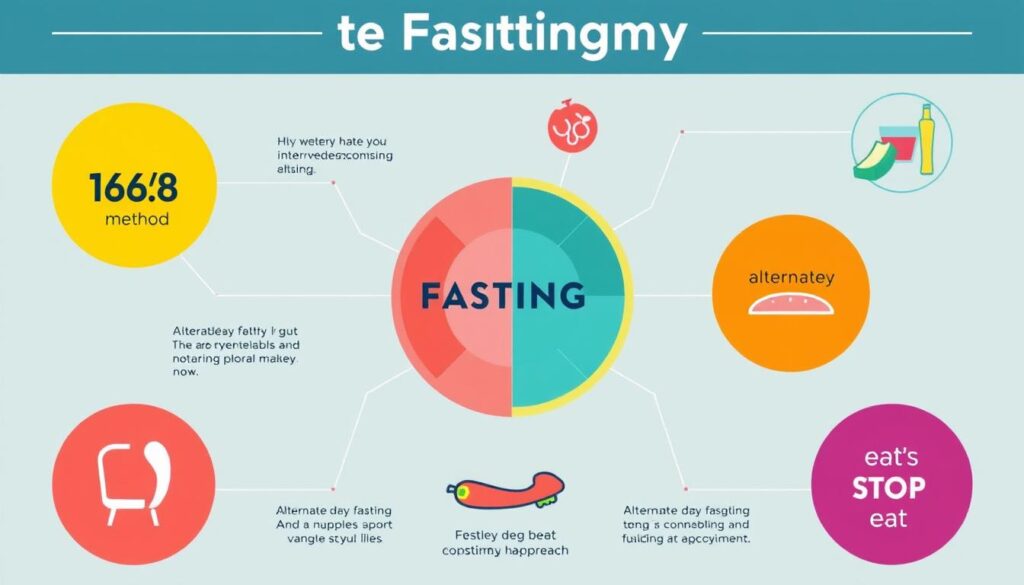Intermittent fasting has gained significant attention in recent years as a potent strategy for optimizing metabolism and promoting overall health. This comprehensive guide delves into the numerous benefits of intermittent fasting for metabolism, shedding light on its impact on weight loss, metabolic health, and longevity. By exploring the science behind intermittent fasting and its effects on the body, we will equip you with the knowledge to harness the power of this transformative eating pattern and unlock your metabolic potential.
Key Takeaways
- Intermittent fasting can boost metabolic rate and enhance fat burning.
- Fasting helps regulate insulin sensitivity and blood sugar levels, benefiting those with diabetes.
- Intermittent fasting can trigger cellular repair processes, such as autophagy, which may have anti-aging effects.
- Different intermittent fasting methods, such as the 16/8 method and 5:2 protocol, offer unique advantages.
- Proper hydration, supplementation, and exercise timing can support your metabolism during fasting periods.
Understanding the Science Behind Intermittent Fasting and Metabolism
Intermittent fasting has gained significant attention for its potential benefits in regulating metabolism and promoting fat burning. To truly grasp the mechanisms at play, it’s crucial to explore the science behind this approach and how it affects various metabolic processes.
How Fasting Affects Metabolic Rate
During periods of fasting, the body undergoes a remarkable shift in its metabolic state. Rather than relying on a constant supply of calories, the body is forced to tap into its stored energy reserves, primarily in the form of fat. This metabolic adaptation results in a more efficient use of energy, leading to a potential increase in calorie restriction metabolism and subsequent fat burning.
The Role of Hormones in Fasting
Intermittent fasting also has a profound impact on the body’s hormonal balance. As the body enters a fasted state, levels of the hormone insulin drop, while the production of hormones like glucagon and growth hormone increases. These hormonal changes facilitate the mobilization of stored fat, enabling the body to utilize fat burning intermittent fasting as a primary energy source.
Metabolic Switching Process
One of the key benefits of intermittent fasting is the body’s ability to switch between different metabolic states. During the fasting period, the body transitions from a glucose-based metabolism to a fat-based metabolism, a process known as “metabolic switching.” This shift in fuel sources allows the body to access and burn stored fat more efficiently, ultimately contributing to weight management and overall metabolic health.

By understanding the intricate scientific mechanisms behind intermittent fasting and its impact on calorie restriction metabolism and fat burning intermittent fasting, individuals can make informed decisions about incorporating this powerful tool into their health and wellness routines.
Benefits of Intermittent Fasting for Metabolism
Intermittent fasting has been gaining popularity for its numerous health benefits, particularly when it comes to improving metabolism. By strategically timing your eating and fasting periods, you can unlock a range of metabolic advantages that can lead to enhanced overall wellbeing.
One of the primary benefits of intermittent fasting for metabolism is improved insulin sensitivity. During the fasting periods, your body becomes more efficient at regulating blood sugar levels, which can help reduce the risk of insulin resistance and type 2 diabetes.
Furthermore, intermittent fasting can boost fat burning by promoting the use of stored fat as a source of energy. This metabolic shift, known as “metabolic switching,” allows your body to become more adept at tapping into fat reserves, leading to potential weight loss and improved body composition.
Another crucial benefit of intermittent fasting for metabolism is increased metabolic flexibility. By exposing your body to cycles of fasting and feeding, you can train it to adapt and become more efficient at utilizing different fuel sources, such as carbohydrates and fats, depending on the available energy supply.
| Benefit | Description |
|---|---|
| Improved Insulin Sensitivity | Intermittent fasting enhances the body’s ability to regulate blood sugar levels, reducing the risk of insulin resistance and type 2 diabetes. |
| Enhanced Fat Burning | Fasting periods promote the use of stored fat as a primary energy source, leading to potential weight loss and improved body composition. |
| Increased Metabolic Flexibility | Intermittent fasting helps the body become more adaptable, allowing it to efficiently utilize different fuel sources, such as carbohydrates and fats, as needed. |
By harnessing the power of intermittent fasting, you can unlock a range of metabolic benefits that can lead to improved overall health and wellbeing. Explore the various intermittent fasting methods to find the one that best fits your lifestyle and preferences.

Different Types of Intermittent Fasting Methods
Intermittent fasting has gained popularity as an effective approach to intermittent fasting weight loss and improved metabolic health. While the concept of fasting may seem daunting, there are several different methods that cater to individual preferences and lifestyles. Let’s explore some of the most common intermittent fasting protocols and their benefits.
16/8 Method Overview
The 16/8 method is a popular choice among intermittent fasters. It involves fasting for 16 hours and restricting your daily eating window to 8 hours. This approach can be particularly effective for intermittent fasting weight loss, as it allows your body to enter a fasted state and utilize stored fat for energy.
5:2 Protocol Explained
The 5:2 protocol involves consuming a normal, healthy diet for 5 days of the week and significantly reducing caloric intake (usually to around 500-600 calories) for the remaining 2 days. This method can be beneficial for metabolic health intermittent fasting, as it allows for periods of caloric restriction that can promote metabolic adaptations.
Alternate Day Fasting Benefits
Alternate day fasting involves alternating between a fasting day and a feeding day. On fasting days, individuals typically consume only water, black coffee, or other non-caloric beverages. This approach can be effective for those seeking more profound metabolic benefits, as it allows for prolonged periods of fat-burning and cellular repair.
Regardless of the specific method, incorporating intermittent fasting into your lifestyle can provide numerous advantages for both intermittent fasting weight loss and overall metabolic health. It’s important to consult with a healthcare professional to determine the most suitable approach for your individual needs and preferences.

“Intermittent fasting is a powerful tool for optimizing metabolic health and promoting sustainable weight management.”
How Intermittent Fasting Enhances Fat Burning
Intermittent fasting has been shown to be an effective strategy for boosting fat burning and optimizing metabolic efficiency. By cycling between periods of fasting and eating, the body enters a state of fat burning intermittent fasting, where it shifts its primary fuel source from glucose to stored fat.
During the fasting periods, the body enters a state of calorie restriction metabolism, where it begins to mobilize and utilize fat stores for energy. This process, known as fat oxidation, can lead to significant weight loss and improved body composition over time.
- Increased Fat Utilization: Intermittent fasting triggers the body to use stored fat as its primary energy source, leading to a higher rate of fat burning and reduced fat mass.
- Metabolic Efficiency: By cycling between fasting and feeding periods, the body becomes more efficient at using and regulating energy, resulting in a more optimized metabolic rate.
- Hormonal Regulation: Fasting can positively impact key hormones, such as insulin and growth hormone, which play a crucial role in fat metabolism and overall body composition.
“Intermittent fasting has been shown to increase fat burning and improve metabolic efficiency, making it an effective tool for weight management and overall health.”
Moreover, the combination of fat burning intermittent fasting and calorie restriction metabolism can help individuals achieve their weight loss goals more effectively, as the body becomes better equipped to utilize stored fat for energy during periods of reduced calorie intake.

By understanding the mechanisms behind how intermittent fasting enhances fat burning, individuals can optimize their fasting regimens and achieve sustainable results in their weight management and overall metabolic health.
Impact of Fasting on Insulin Sensitivity and Blood Sugar
Incorporating intermittent fasting into your lifestyle can have a profound impact on your metabolic health, particularly in terms of insulin sensitivity and blood sugar regulation. By understanding how fasting affects these critical factors, you can harness the power of this dietary approach to optimize your overall well-being.
Glucose Regulation During Fasting
During periods of fasting, your body undergoes a natural metabolic shift, prioritizing the utilization of stored fat for energy instead of relying solely on glucose. This process helps to improve insulin sensitivity, ensuring that your cells can more effectively respond to and utilize insulin, a key hormone responsible for regulating blood sugar levels.
Long-term Effects on Insulin Resistance
Sustained intermittent fasting has been shown to have long-term benefits for metabolic health, including a reduction in insulin resistance. By improving your body’s ability to manage blood sugar, you can reduce the risk of developing type 2 diabetes and other related health issues.
Managing Diabetes Through Fasting
For individuals living with diabetes, intermittent fasting can be a powerful tool for managing their condition. By improving insulin sensitivity and promoting better blood sugar control, fasting can help reduce the need for medication and improve overall metabolic well-being.
| Metric | Fasting Benefits |
|---|---|
| Insulin Sensitivity | Improved |
| Blood Sugar Regulation | Enhanced |
| Diabetes Management | Facilitated |
By understanding the impact of intermittent fasting on insulin sensitivity and blood sugar, you can make informed decisions to support your overall metabolic health and well-being.
Cellular Repair and Autophagy Benefits
When it comes to the remarkable benefits of intermittent fasting, one of the most fascinating aspects is its impact on cellular-level processes. Through the practice of intermittent fasting, the body enters a state of cellular repair and autophagy, which can have far-reaching implications for overall health and longevity.
Autophagy, a Greek word meaning “self-eating,” is a vital cellular process in which the body recycles and removes damaged or dysfunctional components. During periods of fasting, the body shifts into this self-cleaning mode, clearing out old, worn-out cells and making way for the regeneration of new, healthier ones.
“Intermittent fasting has been shown to enhance autophagy, a cellular process that is crucial for the removal of damaged proteins and organelles, leading to improved cellular function and reduced risk of disease.”
This process of cellular repair is not only important for maintaining optimal cellular function but also plays a crucial role in reducing the risk of various age-related diseases. By removing damaged cellular components and promoting the growth of new, healthy cells, intermittent fasting can help combat the effects of aging and support overall longevity.
Moreover, the benefits of intermittent fasting go beyond just autophagy. During periods of fasting, the body also triggers the release of growth hormones, which can further enhance cellular repair and promote the regeneration of tissues. This can lead to a wide range of health improvements, from improved skin quality to enhanced muscle tone and increased energy levels.
By understanding the cellular-level benefits of intermittent fasting, individuals can make informed decisions about incorporating this powerful dietary approach into their lifestyle, reaping the rewards of improved cellular health and longevity.
Anti-aging Effects and Longevity Potential
Intermittent fasting has been the subject of growing research for its remarkable potential to slow down the aging process and promote longevity. By understanding the underlying cellular mechanisms and the impact on oxidative stress, we can uncover the remarkable anti-aging benefits of this powerful dietary approach.
Cellular Aging Mechanisms
As we age, our cells undergo a gradual deterioration, known as cellular senescence. This process is accelerated by factors like oxidative stress and inflammation. Intermittent fasting has been shown to activate cellular repair pathways, such as autophagy, which help remove damaged cellular components and promote the regeneration of healthy cells. This cellular rejuvenation can significantly slow down the aging process at the fundamental level.
Research on Lifespan Extension
- Studies on animal models have demonstrated that intermittent fasting can extend lifespan by up to 30%, thanks to its ability to modulate various longevity pathways.
- In human studies, intermittent fasting has been linked to reduced risk of age-related diseases, such as Alzheimer’s, Parkinson’s, and cardiovascular disorders, suggesting its potential to enhance longevity.
Oxidative Stress Reduction
Oxidative stress is a significant contributor to the aging process, as it can damage cellular components and impair their function. Intermittent fasting has been shown to reduce oxidative stress by enhancing the production of antioxidant enzymes and promoting the removal of damaged molecules. This protective effect against oxidative stress is a crucial mechanism by which intermittent fasting may exert its anti-aging benefits.
“Intermittent fasting holds tremendous promise for slowing down the aging process and improving overall metabolic health. The research is quite compelling and warrants further exploration.” – Dr. Sarah Hallberg, Obesity Medicine Specialist
Supporting Your Metabolism During Fasting Periods
As you embark on your intermittent fasting journey, it’s crucial to support your metabolism during the fasting periods. Proper hydration, strategic supplementation, and optimal exercise timing can all contribute to maximizing the benefits of benefits of intermittent fasting for metabolism and metabolic health intermittent fasting.
Hydration Strategies
Staying well-hydrated is essential during fasting periods. Aim to drink plenty of water, herbal teas, and other non-caffeinated beverages to keep your body functioning optimally. Avoid sugary drinks and excessive caffeine, as they can interfere with your metabolic processes.
Supplement Considerations
While intermittent fasting can provide numerous benefits, it’s important to consider incorporating certain supplements to support your metabolism. Supplements like electrolytes, B vitamins, and omega-3 fatty acids can help maintain healthy metabolic function during the fasting periods.
Exercise Timing Tips
Timing your exercise routine with your fasting schedule can further enhance the benefits of intermittent fasting for metabolism and metabolic health intermittent fasting. Consider performing your workouts during the fasting window to take advantage of the increased fat-burning potential and metabolic adaptations that occur during this time.





